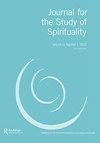Genealogies of spirituality: An historical analysis of a travelling term
IF 0.8
0 RELIGION
引用次数: 15
Abstract
ABSTRACT In the current discussion of spirituality in healthcare, the historical and cultural backgrounds of spiritual terminology and practices are often neglected. Avoiding the standard narratives, which tend to be based on a single concept of spirituality, the present paper provides an overview of the genealogies of the term ‘spirituality’, paying particular attention to the concept’s heterogeneity and history of bifurcation. The historical reconstruction outlines the complex travels of spirituality in delineating the etymological legacies of early and mediaeval Christianity, late-mediaeval and early modern mysticism, romanticism and, finally, of the amalgamations of all these things in the twentieth century. Tracing the development of the terminology in this way will elucidate the historical roots of the current ambiguities of spirituality. Over time, spirituality has crossed different cultural spaces and has been invested with new meanings. The final sections concern the presence of the various pasts of spirituality and the ongoing travelling of this term in the world of healthcare. It will be argued that ‘spirituality’ shares its ambiguous character with the concept of ‘health’. As health-related spirituality is inevitably imbued with value and connected with healthcare politics and law, the task of clarifying this ‘travelling concept’ will remain as important as it is interminable. Research in the field of health-related spirituality must free itself from the illusion of universally valid concepts with stable meanings. An improved understanding of the many pasts of spirituality can make a valuable contribution to the perception and understanding of the fluid, emergent and sometimes contradictory phenomena associated with the concept.灵性谱系:一个旅行术语的历史分析
在当前关于精神卫生的讨论中,精神术语和实践的历史和文化背景往往被忽视。本文避免了基于单一灵性概念的标准叙述,概述了“灵性”一词的谱系,特别关注了这个概念的异质性和分叉的历史。历史重建勾勒出了复杂的灵性之旅,勾勒出了早期和中世纪基督教,中世纪晚期和早期现代神秘主义,浪漫主义的词源遗产,最后是20世纪所有这些东西的融合。以这种方式追踪术语的发展将阐明当前灵性含糊不清的历史根源。随着时间的推移,灵性已经跨越了不同的文化空间,并被赋予了新的含义。最后部分关注灵性的各种过去的存在以及这个术语在医疗保健领域的持续旅行。有人会说,“灵性”与“健康”的概念有着同样模糊的特征。由于与健康相关的灵性不可避免地充满了价值,并与医疗保健政治和法律联系在一起,因此澄清这一“旅行概念”的任务将仍然是重要的,因为它是无休止的。健康相关灵性领域的研究必须摆脱对具有稳定意义的普遍有效概念的幻想。更好地了解灵性的许多过去,可以对感知和理解与该概念相关的流动、突发和有时相互矛盾的现象作出宝贵贡献。
本文章由计算机程序翻译,如有差异,请以英文原文为准。
求助全文
约1分钟内获得全文
求助全文
来源期刊

Journal for the Study of Spirituality
RELIGION-
CiteScore
2.50
自引率
7.10%
发文量
25
期刊介绍:
Journal for the Study of Spirituality is a peer-reviewed journal which creates a unique interdisciplinary, inter-professional and cross-cultural forum where researchers, scholars and others engaged in the study and practices of spirituality can share and debate the research, knowledge, wisdom and insight associated with spirituality and contemporary spirituality studies. The British Association for the Study of Spirituality (BASS) organises a biennial international conference and welcomes enquiries about membership from those interested in the study of spirituality in the UK and worldwide. The journal is concerned with what spirituality means, and how it is expressed, in individuals’ lives and communities and in professional practice settings; and with the impact and implications of spirituality in, and on, social policy, organizational practices and personal and professional development. The journal recognises that spirituality and spiritual values can be expressed and studied in secular contexts, including in scientific and professional practice settings, as well as within faith and wisdom traditions. Thus, Journal for the Study of Spirituality particularly welcomes contributions that: identify new agendas for research into spirituality within and across subject disciplines and professions; explore different epistemological and methodological approaches to the study of spirituality; introduce comparative perspectives and insights drawn from different cultures and/or professional practice settings; aim to apply and develop sustained reflection, investigation and critique in relation to spirituality and spiritual practices; critically examine the values and presuppositions underpinning different forms of spirituality and spiritual practices; incorporate different forms of writing and expressions of spirituality.
 求助内容:
求助内容: 应助结果提醒方式:
应助结果提醒方式:


